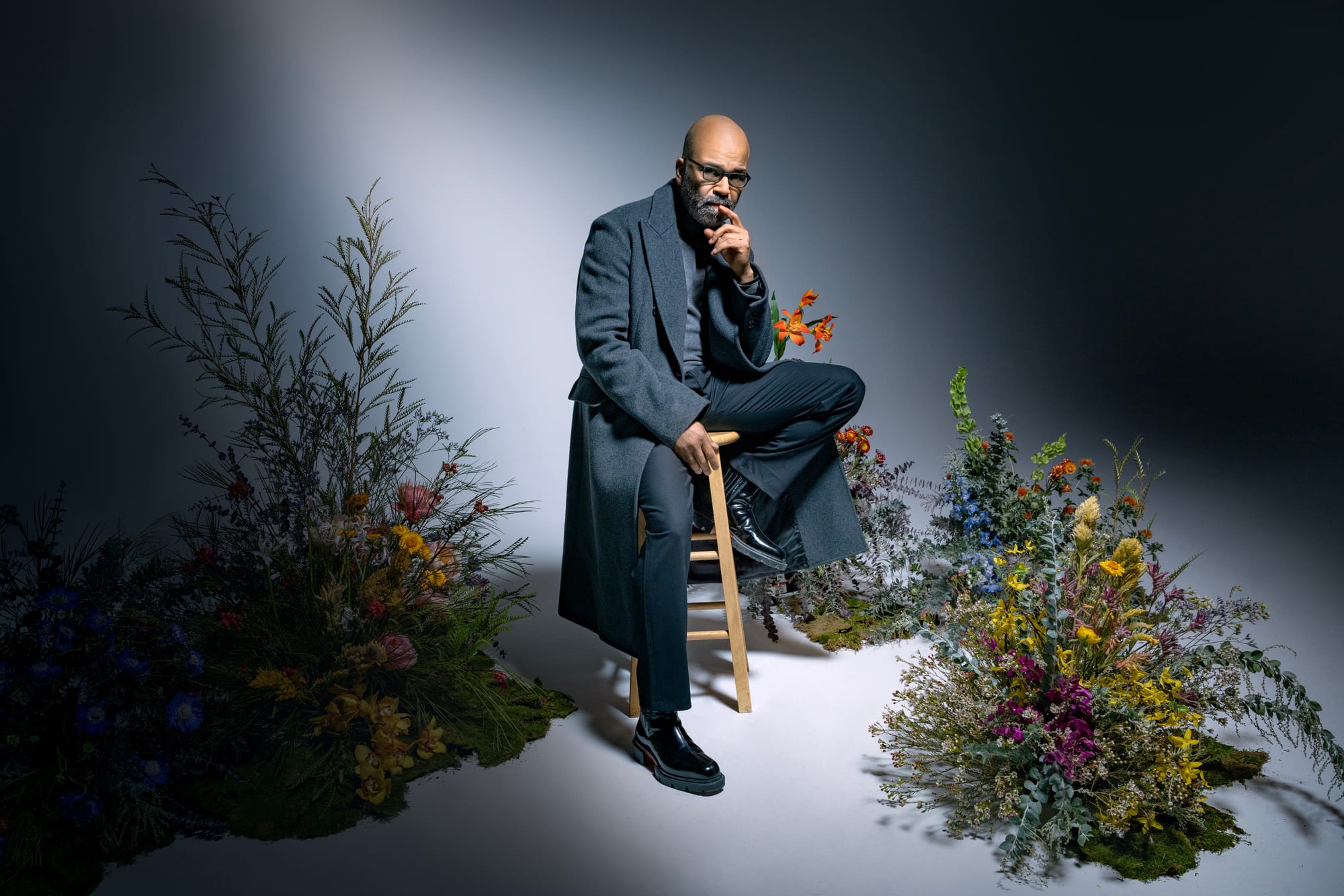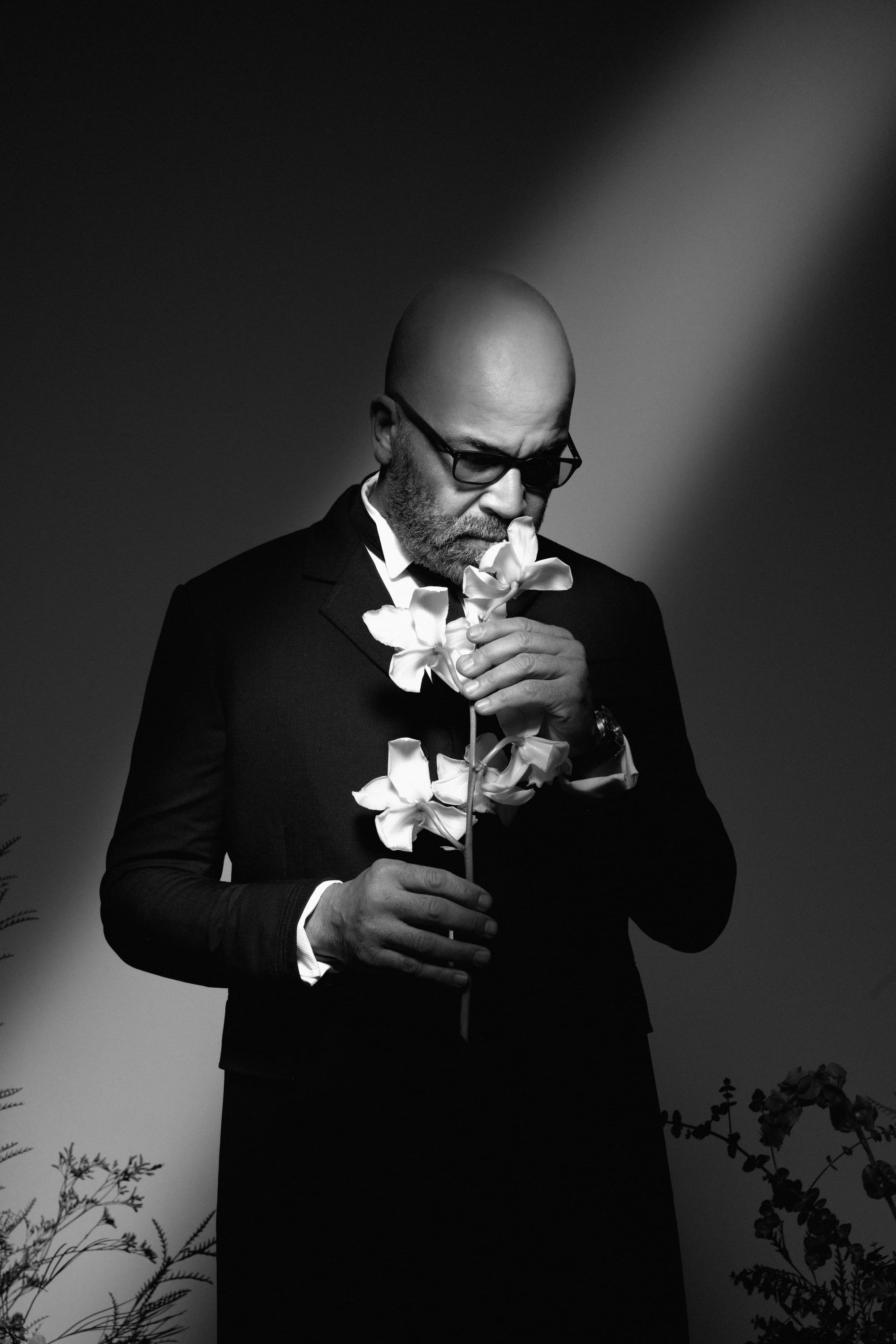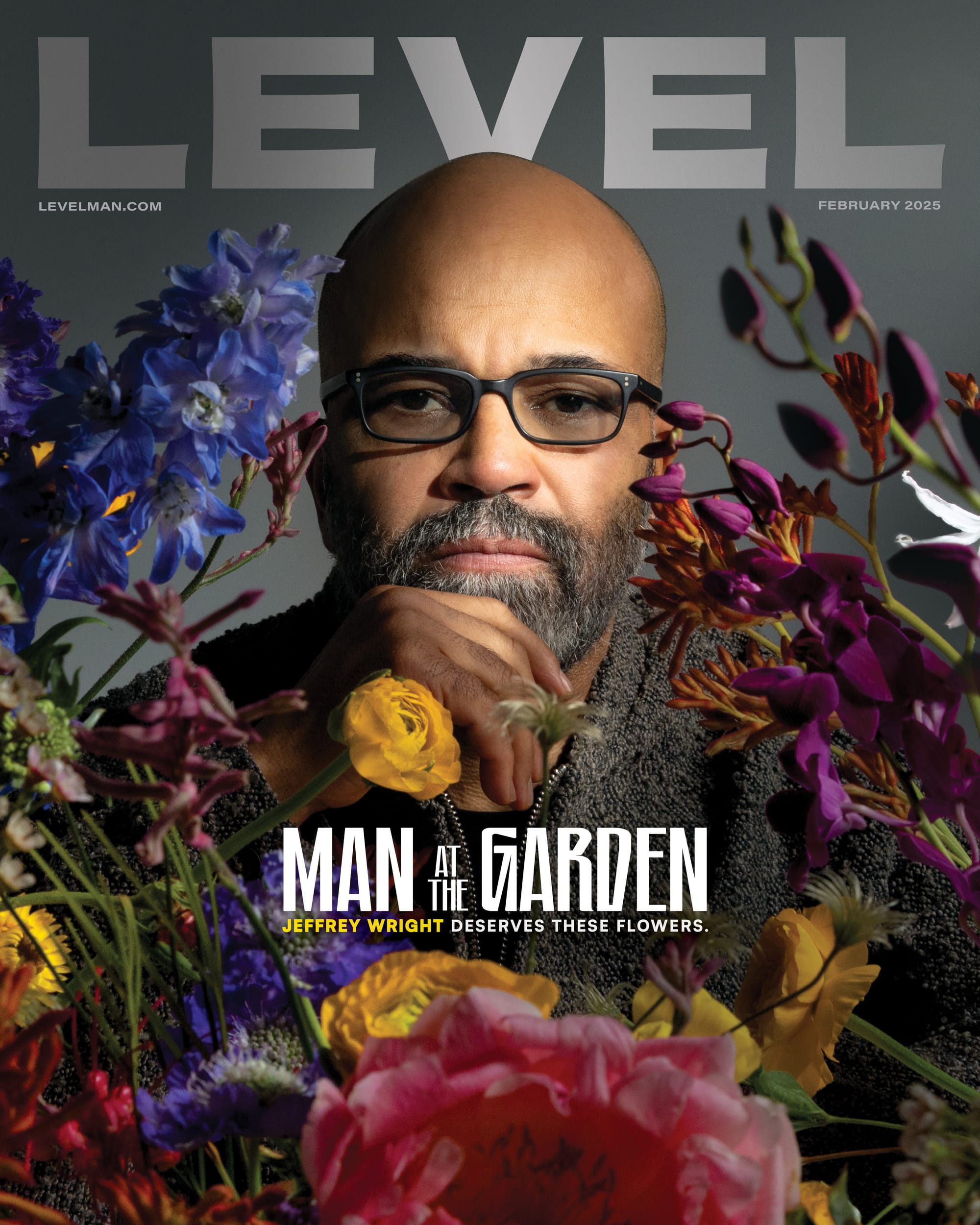
How Jeffrey Wright Blossomed Into A Brilliant American Actor
He’s an Oscar and Grammy away from joining the prestigious EGOT class but Hollywood’s most flexible man deserves his flower’s now
On a cavernous set in Los Angeles, Jeffrey Wright is taking up space.
He’s meticulous, attached to a pair of black frames that impede eye contact. And as the photographer walks in and out of his personal space, Mr. Wright asks to see the photos captured. Her camera screen is small so he walks over for better light. He’s pleased with what he sees and is now ready for shots to rapid fire. And action.
2024 was a banner year for one of Hollywood’s most respected and flexible thespians. His role as Theolenous “Monk” Ellison in 2023’s American Fiction was the type of small-film performance that the Academy loves. Playing a man with a big brain and an edge, the role was the closest he’s come to his real-life persona.
Hyper-intelligence and unassuming humor are all attributes of the 59-year-old Brooklynite. He’s a product of a private school education from St. Albans in D.C. and graduated from Amherst with a political science degree. He then enrolled at NYU’s film school to pursue an MFA. Wright left early to begin his acting journey
His many masks include Jean-Michael Basquiat, Martin Luther King, Jr., The Powell’s both Adam and Colin, and Muddy Waters. He’s not necessarily method acting but there’s something special about the way Wright devours a character whole.
Wright’s newest role is deputy chief of station at the CIA’s London Branch in political thriller The Agency (Paramount+). Starring opposite Michael Fassbender, it’s the type of geopolitics content that revs his motor. But at this moment, two weeks before Donald Trump is inaugurated as America’s 57th president, he’s more concerned with the country needing an enema.
Says Wright: “There's dysfunction in the discourse right now that leads to the type of chaos that Donald Trump—a failed self-promoting newfangled politician who was so incompetent as a business leader outside of his own self-promotion, that he failed at running craps tables—is [seen as] the answer.”
It’s hard not to keep discussing politics. But let’s try. You can do art house, theater, plays, blockbusters and no matter the film, you can be that character. Yes, that’s what acting is--or should be. But you’ve got something special. What’s your trick to consistency?
The biggest trick for me is having worked in the theater for many years. The work that you do on stage is not gifted to you by a studio executive. You're not on the stage successfully because someone is trying to position you. You're not able to convey story on stage because of an editor. You have to learn to do it yourself. And so I worked for about seven years after I moved to New York, consistently three, four plays a year until I was cast in Angels in America with George Wolf. And it was only in the middle of that production that I said to myself, okay, I'm an actor now.
You portray these larger-than-life characters, how important is the rest of the cast and crew for you to get to that place you need to be?
Lately I've worked with a wonderful group of directors from people like Spike Lee this year, Wes Anderson, Matt Reeves on The Batman. I've found myself with Cord Jefferson, who was a new director, but had written a wonderful script and assembled a great group of artists together to tell the story of American Fiction. I've just found myself in positions where I'm getting a lot of great support, so it gives me the opportunity to do the best work that I can.
You won a Tony and Golden Globe for your portrayal of a gay, Black character named Belize, in Angels in America What did that role mean to you?
I was a kid who grew up spending more time in locker rooms playing football and lacrosse than dressing rooms. And the locker room space at that time, and even now, is not necessarily a time that welcomes a character like Belize.
The role of Belize asked me to express a type of masculinity that is unorthodox because Belize is a man, but he's a man who embraces and expresses all of himself, including the femininity within him. That took some work for me to be able to present on stage within the context of the larger story that was being told.

How did you end up finding your rhythm with that character?
I think initially I may have been focused more on exterior things and working from the outside in a way that was kind of superficial. They actually wanted to fire me because I took so much time in the rehearsal process.
That’s hard to believe.
George Wolfe was the only one I think who was looking out for me, and he called me one day, the last rehearsal. He said, Jeffrey, it's not working.I said, I know George. I have one more day. I needed to work from the inside out. Yes, this was a former drag queen. Yes, this was a flamboyant queen. But first and foremost, he was a caregiver. He was a friend, he was a warrior, he was a lover. And working from that perspective, understanding who he was in the interior, an isolated man, but a man who was, as I described, free and purposeful, allowed me to understand the humanity.
You referred to Belize as your center. Is he the most important role you've played?
Most important. The play itself, Angels in America, sits on its own shelf. I did the play, and then obviously I did the miniseries 10 years later. But that piece of writing is unsurpassed. I mean, that piece of writing sits on the shelf with the great pieces of writing in the American canon, both theatrical, dramatic literature and all categories of literature in America.
You’ve played Basquiat and said you saw similarities between you two. What were those similarities?
He was walking into a room often the only [Black man]. I know that story well. So yeah, I felt a kinship with him. I think I had a sense then that I was pretty good at what I did at my work and he was exceptional at his. I very much considered him a type of creative relative.

You’ve said that the country needs to get more comfortable talking about race because we run from it. You’ve also played Martin Luther King. Do you find it ironic that Donald Trump was sworn in on his holiday?
In some ways, the election was a window on the American soul, and apparently it has a big Trump sign in the middle of it. But at the same time, I don't feel that it is a time to be afraid. There are certainly things to be wary of because there's this anti-American, anti-democratic, anti-government attempt to dismantle our country and remake it in the image of this clown Donald Trump and this oligarchical clown Elon Musk. There are things to be wary of, but it's also a time to be profoundly defiant and unafraid and fight for the soul of this country if it's not too late.
Let’s go to a happier place. Your grandfather is who you model as a man. Tell me a little about him.
My grandfather was a waterman and a crabber and a farmer and a whiskey man and a pitcher in the Negro Leagues. He was everything—a country gentleman with salt water in his veins.
Do you remember your time together?
This was at a time, largely in the seventies when I was a kid. I would go down [to Virginia] every summer and holiday from DC. There were still miles of corn fields instead of miles of strip malls. People didn't even know it, but they were eating organic food because they were all about the organics because he was growing vegetables using crab shell as fertilizer. He would take discarded crabshell—an old native American trick—and use that to fertilize his crops. That was a magical time, and it was a time that grounded me in simple things. It molded me, even though I went off to elitist and privileged schools and had access to things that my grandfather did not, things that many of the people down there never had access to, I always had an anchor back there that touched down at the bottom of the Chesapeake Bay.
Your father passed away when you were young. What was early life like with your mother?
I was raised by my mother and my aunt, two women, which was [like] being raised, I'd say by a dozen men. My mother was tough, but my mother was above all things dedicated to shepherding me. I realized that when she passed. Everything that I have been able to do in my life is a result of her work and the design that she had for me. Not that she necessarily wanted me to be an actor or an artist, but she made it all possible in that she presented all things to me as a child, including the creative, including the scholastic, including the athletic. She laid it all out for me, and I was able to find myself somewhere in each of these things and then ultimately craft a way forward out of it. But it was all a result of her dedication to building my life.
You also look at the cast as family. What intrigued you about the casting of The Agency?
When I was presented with the possibility of being on the show, only Michael Fassbender had been cast. He's a wonderful actor and occupies his own unique space. He's less interested in the movie star thing and more interested in the work. So he was on board. And then George Clooney and Grant Heslov were on board to produce. I'd worked with George and Grant before, so I knew the level of work that they shoot for. Richard Gere came on board, and John Magaro who is a wonderful actor. Those are the folks that I was working most with. We found a great groove, a way of working together on material that was interesting to us, and material that was touching on political realities.
What impressed you about the script?
It was stuff that was curious and relevant and stuff that's up my alley—geopolitics and political intrigue. I wasn't necessarily intending on doing another series, but they enticed me [laughs].
You worked with Denzel Washington in Manchurian Candidate. What was it like sharing scenes again in Spike Lee’s crime-thriller, High and Low?
I was only there for a couple of weeks [on Manchurian Candidate]. There's that opening scene, and then there's some of the scenes, which are part of the flashback. But we really got an opportunity to work together in a much more intimate way with Spike's film.
But Denzel is singular. He took the baton from Sidney Poitier, so yeah, he is his own room, but at the same time, yes, he's a major movie star and all of that, but he is an actor first and he wants to dig down and make the scene fly to the extent that it can. We got in there and played. There were things that happened that were unexpected. There were moments that were born [out of] exploring the moment. He really is trying to not retrace steps but invent the scene in the moment every time, every chance he can.
You are pretty singular yourself, Jeffrey.
I've had a lot of experience doing this. I've been doing this thing for a long time, so I tend to know what I'm doing or know what I want to do.